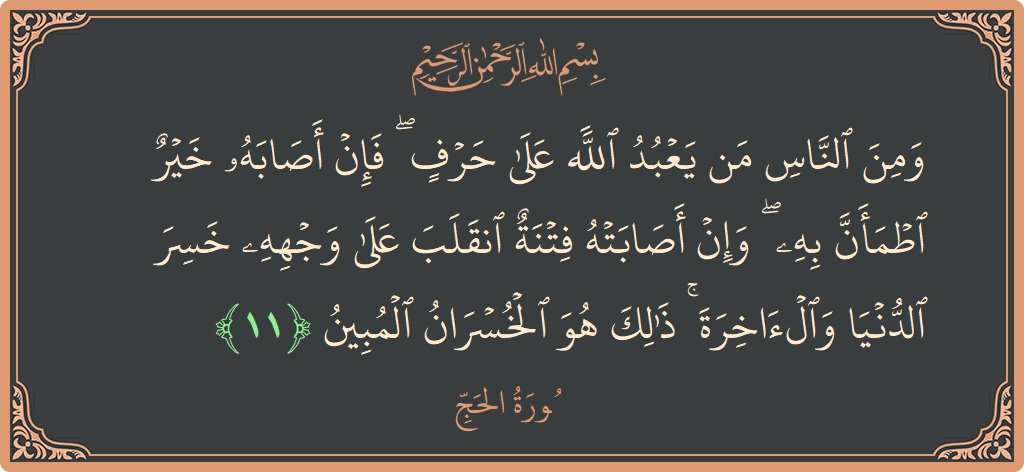Surah Al-Hajj: Verse 11 - ومن الناس من يعبد الله... - English
Tafsir of Verse 11, Surah Al-Hajj
English Translation
And of the people is he who worships Allah on an edge. If he is touched by good, he is reassured by it; but if he is struck by trial, he turns on his face [to the other direction]. He has lost [this] world and the Hereafter. That is what is the manifest loss.English Transliteration
Wamina alnnasi man yaAAbudu Allaha AAala harfin fain asabahu khayrun itmaanna bihi wain asabathu fitnatun inqalaba AAala wajhihi khasira alddunya waalakhirata thalika huwa alkhusranu almubeenuTafsir of Verse 11
Commentary
(And among men there is one who worships Allah (standing) on the verge - 22:11.) Bukhari and Ibn Abi Haim have related from Sayyidna Ibn ` Abbas ؓ that when the Holy Prophet ﷺ migrated to Madinah, people flocked to him and accepted the new religion. But there were some among them whose conversion to Islam was far from being genuine, and whose sole motive for their action was to seek self-advancement, and they lacked conviction. If, after becoming Muslims, favorable circumstances resulted in an increase in their prosperity and their children, they thought Islam was a very good religion, but they were equally ready to condemn it if things went against their personal interests. This verse was revealed to describe such people who were mere opportunists and were easily swayed either way depending on where their selfish interests lay.
The meaning of worshipping Allah as it were upon the edge
Mujahid, Qatadah and others said:
(upon the edge) means, in doubt. Others said that it meant on the edge, such as on the edge or side of a mountain, i.e., (this person) enters Islam on the edge, and if he finds what he likes he will continue, otherwise he will leave. Al-Bukhari recorded that Ibn `Abbas said:
(And among mankind is he who worships Allah as it were upon the edge.) "People would come to Al-Madinah to declare their Islam and if their wives gave birth to sons and their mares gave birth to foals, they would say, `This is a good religion,' but if their wives and their mares did not give birth, they would say, `This is a bad religion."' Al-`Awfi reported that Ibn `Abbas said, "One of them would come to Al-Madinah, which was a land that was infected with a contagious disease. If he remained healthy there, and his mare foaled and his wife gave birth to a boy, he would be content, and would say, `I have not experienced anything but good since I started to follow this religion."
(but if a Fitnah strikes him), Fitnah here means affliction, i.e., if the disease of Al-Madinah befalls him, and his wife gives birth to a babe girl and charity is delayed in coming to him, the Shaytan comes to him and says: `By Allah, since you started to follow this religion of yours, you have experienced nothing but bad things,' and this is the Fitnah." This was also mentioned by Qatadah, Ad-Dahhak, Ibn Jurayj and others among the Salaf when explaining this Ayah. Mujahid said, concerning the Ayah:
(he turns back on his face.) "(This means), he becomes an apostate and a disbeliever."
(He loses both this world and the Hereafter.) means, he does not gain anything in this world. As for the Hereafter, he has disbelieved in Allah the Almighty, so he will be utterly doomed and humiliated. So Allah says:
(That is the evident loss.), i.e., the greatest loss and the losing deal.
(He calls besides Allah unto that which can neither harm him nor profit him.) means, the idols, rivals, and false gods which he calls upon for help, support and provision -- they can neither benefit him nor harm him.
(That is a straying far away.)
(He calls unto him whose harm is nearer than his profit;) means, he is more likely to harm him than benefit him in this world, and in the Hereafter he will most certainly cause him harm.
(certainly an evil Mawla and certainly an evil `Ashir!) Mujahid said, "This means the idols." The meaning is: "How evil a friend is this one upon whom he calls instead of Allah as a helper and supporter."
(and certainly an evil `Ashir!) means the one with whom one mixes and spends one's time.
